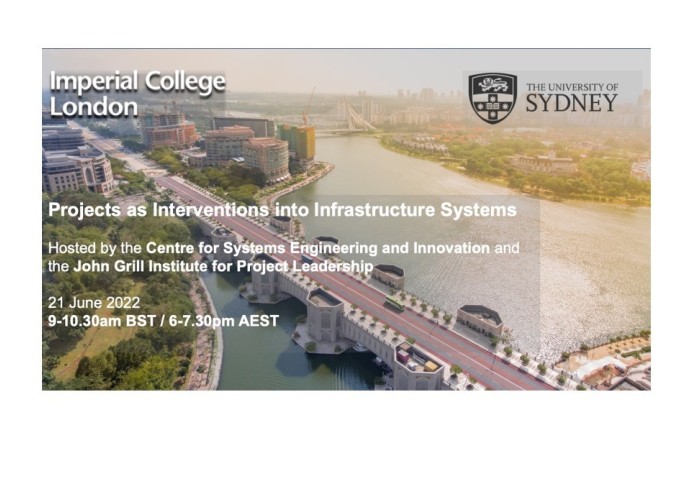Projects as Interventions in Infrastructure Systems

Projects as Interventions in Infrastructure Systems
On 21 June 2022, the Centre for Systems Engineering and Innovation at Imperial College London and the John Grill Institute for Project Leadership at the University of Sydney co-hosted a workshop on the need to see projects as interventions in wider systems, and the implications of such a mindset shift.
Infrastructure projects intervene into this world and shape its futures. However, we are not in a ‘business as usual world’. It follows that we cannot carry on approaching the way we conceive and deliver infrastructure and the built environment in a ‘business as usual’ manner. There is significant work being done at national and international policy level to transform the way decisions are made about the built environment. This requires different understanding from owners, sponsors and government, as well as from professionals involved in project conception, set-up, design, delivery and hand-over. The challenge is now to implement this policy, to transform understanding of what projects are, and how they deliver value. This is vitally important in a world of significant uncertainty and complexity arising in the context of rapidly changing technologies, growing recognition of stakeholders, and changing weather and climate. Nonetheless, there is the potential to draw on the research base to rapidly transform in order to reduce infrastructure and industry’s carbon and other environmental footprints and achieve resilience in complex systems.
Need for leadership in implementing projects as interventions
Drawing on the expertise of two internationally leading centres of excellence, the Centre for Systems Engineering and Innovation and the John Grill Institute for Project Leadership, the workshop provided an opportunity to discuss international collaboration and the role the international research base can play in providing the evidence for what works. In addition, the workshop sought to explore and develop leadership skills to implement projects as interventions into wider systems. It covered:
- Fundamentals of understanding projects as interventions into systems of systems.
- Situating infrastructure in the context of (changing) natural environments, with ‘projects for resilience’ rather than resilience in projects.
- The need for projects to be seen as interventions to achieve social, economic and environmental outcomes in a changing world, rather than being siloed asset delivery.
- The role of owners, sponsors and government in enabling projects to be understood as interventions.
- The policy context for infrastructure transitions, and practical examples from industry and research.
The morning was opened by Professor Jennifer Whyte, Director of the John Grill Institute for Project Leadership, and Dr Ana Mijic, Director of the Centre for Systems Engineering and Innovation, who welcomed the over 200 registered attendees.
Professor Whyte then chaired the first session of the day on Global Policy Context. The panel for this session comprised of Maud de Vautibault, Global Infrastructure Hub, Peter Colacino Infrastructure Australia, Andrew McNaughton, ICE. The discussion focused on:
- Envisioned challenges of transitioning from policy documents to practice
- How the international research community can support these agendas
Andrew McNaughton switched to the role of Chair for the second session on Project Sponsorship and Delivery. The speakers, David Ballantyne, PWC Australia, Dale Evans, Project 13, David Gainsford, Deputy Secretary Development Assessment, NSW Dept of Planning and Environment, and Dr Lara Mottee, University of Sydney discussed:
- How to make the shift from policy and research to practice
- The importance of early engagement and the key decisions to make at the start of a project
- The role of stakeholders
- How the leadership model needs to change in order to deliver desired outcomes
The third and final session on Bringing together Policy, Practice and Research
was chaired by Dr Mijic. The panellists, Mark Enzer, Mott MacDonald, Dr Chris Millard, Laing O’Rourke, Professor Jennifer Whyte, considered issues around:
- What data policy makers and practitioners need to make better decisions
- The mechanisms that can support shaping research agendas and high-impact research on projects as interventions
To see projects as interventions suggests a mindset shift in seeing how projects engage with the natural environment as well as with the social and technological ones. This brings into view the existing and future geology, landscape, climate, weather, water, plants, animals and so on. It also suggests that different skillsets are needed and that projects need to engage with those skillsets. It requires new forms of modelling as well as a focus on choices, recognising that project outcomes have positive and negative impacts on places and people across time. This suggests different forms of engagement with stakeholders, and also discussions about supply chains and how we can best understand their efficiency and sustainability.
To watch a recording of the event click here.
To learn more about our research visit our Research Areas page.
To join us and help us make our research vision come to life, see our Get Involved page or email our Research and Engagement Manager Dr Jeni Giambona, j.giambona@imperial.ac.uk
Sign up for our Newsletter to be notified of our future events and research highlights. Follow us on Twitter @CSEI_imperial.
Article text (excluding photos or graphics) © Imperial College London.
Photos and graphics subject to third party copyright used with permission or © Imperial College London.
Reporter
Jeni Giambona
Department of Civil and Environmental Engineering